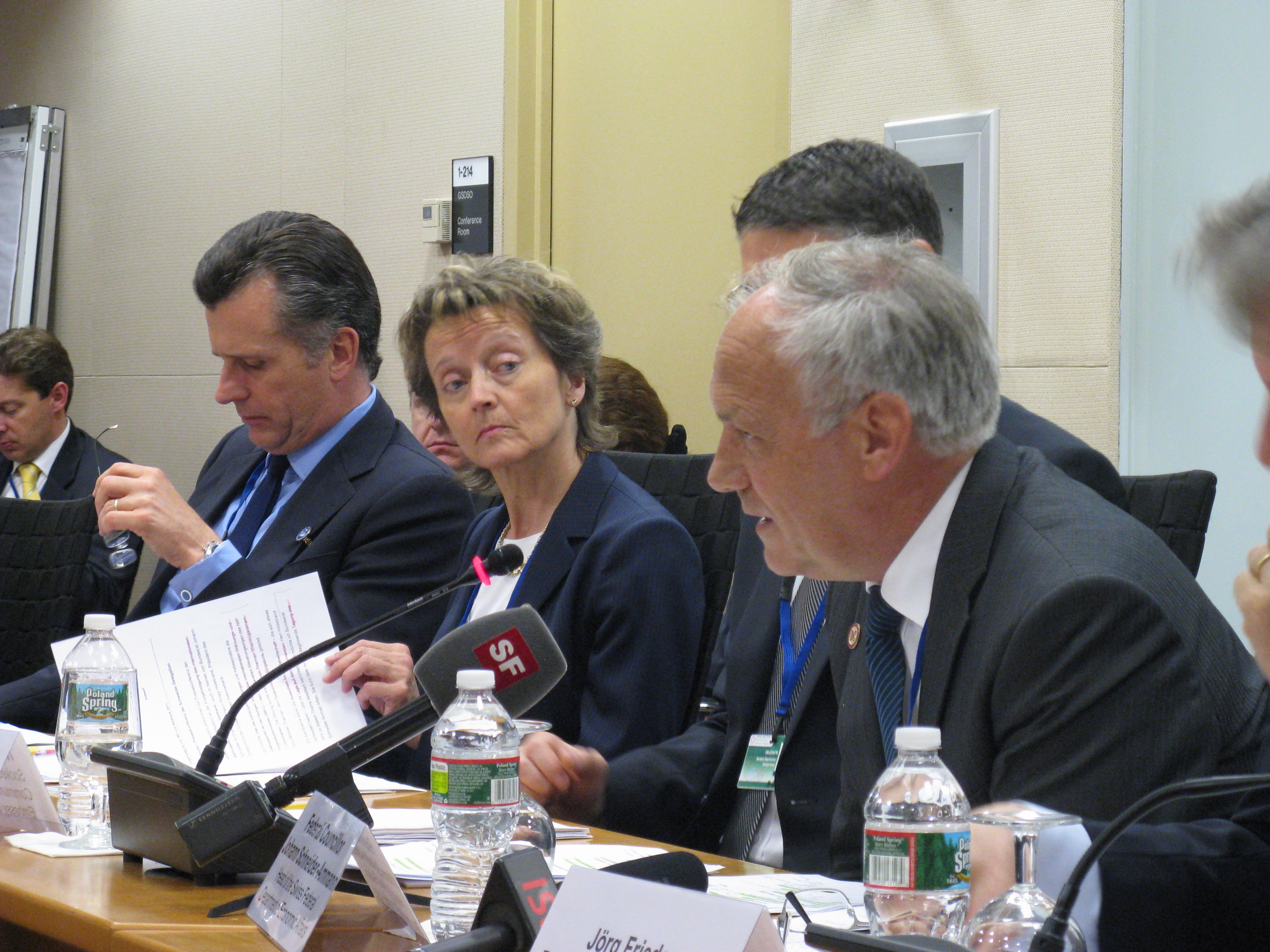
Ministers urged to cooperate on world economy

Global finance ministers and central bankers have concluded three days of talks in Washington with pledges of greater cooperation to avert another financial crisis.
But delegates at the International Monetary Fund (IMF) meeting left it uncertain how far they would go in changing their domestic policies in response to international pressures. They also expressed concern that “significant risks” still threatened the recovery.
While Swiss Finance Minister Eveline Widmer-Schlumpf urged highly indebted developed countries to “pursue credible fiscal consolidation”, she and other Swiss officials admitted that big banks and a hot housing market posed challenges to the recovery in Switzerland.
Although Switzerland has weathered the crisis better than other developed countries, the situation is not all rosy, according to the IMF. The organisation warned of “lax lending standards in the mortgage market” that warrant “pre-emptive measures” from the authorities.
It also expressed concern about “risks related to the two large banks” – UBS and Credit Suisse – and called for the swift adoption by parliament of the cabinet’s draft law aimed at reducing the impact on the national economy of so-called too-big-to-fail banks.
At a joint press briefing in Washington on Saturday, Economics Minister Johann Schneider-Ammann and Philipp Hildebrand, president of the Swiss National Bank (SNB), gave somewhat contrasting reassurances about the potential for a housing bubble in Switzerland.
Watching developments
Schneider-Ammann told swissinfo.ch that a housing bubble was “not a real, serious risk”, in part because of the policies implemented by the Swiss National Bank.
Hildebrand sounded less confident, however. “A housing bubble might or might not be in the making, but the key is that we don’t end up in that situation,” he told swissinfo.ch, noting that the Swiss real estate market had pockets where prices had risen “substantially” and that banks were in a very competitive environment and had “relatively loose” lending standards.
“We didn’t have a housing bubble at the beginning of the crisis, contrary to what happened in some other countries, and it would be a tragedy if we produced a housing bubble now,” he said.
Hildebrand stressed, however, that the Swiss authorities were determined to watch developments closely “and take prudent action, if necessary”.
Risks remain
Regarding the recovery of the world economy, the IMF committee warned that “significant risks” remained. Indeed, public deficits and debt were among the main topics of discussion at and around the spring meetings of the IMF and World Bank.
Other main issues included the economic consequences of the recent popular uprisings in North Africa and the Middle East.
“Credible actions are needed to accelerate progress in addressing challenges to financial stability and sovereign debt sustainability, and to ensure timely fiscal consolidation in advanced countries,” said the IMF’s political body, which comprises the finance ministers of member countries.
In her statement to the committee, Widmer-Schlumpf stressed that although the prospects for a global recovery had solidified, “risks to growth that could derail the global recovery continue to prevail”.
She pointed to instability in the euro area periphery as the key risk, due to concerns about “the sustainability of public debt levels in some economies”.
But broadening her geographical scope to include the United States, she saw “a strong need for many advanced countries to pursue credible fiscal consolidation strategies”, warning that “simply returning to pre-crisis fiscal positions and eliminating structural deficits will not be enough”.
“Deeper inclusion”
As uprisings continue in several North African and Middle Eastern countries, the steering committee asked the IMF to monitor closely related economic fallout.
The IMF was also tasked to assess development aid in those regions. “Together, we can build a better future for those countries,” said Dominique Strauss-Kahn, director of the IMF, referring to Egypt and Tunisia.
He added, however, that it would be critical for all nations to guard against complacency, especially in the face of new threats from higher oil and food prices, which were exacting a heavy toll on the world’s poorest nations.
For his part, Johann Schneider-Ammann said the turmoil in North Africa and the Middle East showed that economic growth must be coupled with “deeper inclusion”.
“It is paramount to expand the positive trends recorded in many parts of the developing world through inclusive and more equitable economic growth, access to basic services and strengthened governance,” he said.
The International Monetary Fund was set up alongside the World Bank in 1945 as part of the so-called Bretton Woods institutions.
The IMF monitors the world economies, lends to members in economic difficulty and provides technical assistance to secure financial stability and reduce poverty.
The financial contributions of its 187 member countries are proportional to the importance of a country’s economy. This also defines their share of the votes.
Switzerland joined in 1992 following a nationwide vote.
Swiss delegation: Led by Finance Minister Eveline Widmer-Schlumpf, it also included Economics Minister Johann Schneider-Ammann, and Philipp Hildebrand, Swiss National Bank chairman.
Topics: The most important topics of discussion in the International Monetary and Financial Committee were the state of the global economy and the future role of the IMF in the international financial and monetary system.
Volatility: The focus of the discussions in the Development Committee (DC) was the volatility of food prices, reforms to the World Bank and the progress on achieving the Millennium Development Goals.
IMF role: Discussions dealt with various measures to strengthen the international financial and monetary system, as was discussed in the last ministerial meeting of the G20. The key topics are possible measures to stabilise capital flows, global financial safety nets, the role of Special Drawing Rights (SDRs) and the strengthening of financial sector monitoring by the IMF.
(Source: Swiss government statement)

In compliance with the JTI standards
More: SWI swissinfo.ch certified by the Journalism Trust Initiative


























You can find an overview of ongoing debates with our journalists here . Please join us!
If you want to start a conversation about a topic raised in this article or want to report factual errors, email us at english@swissinfo.ch.